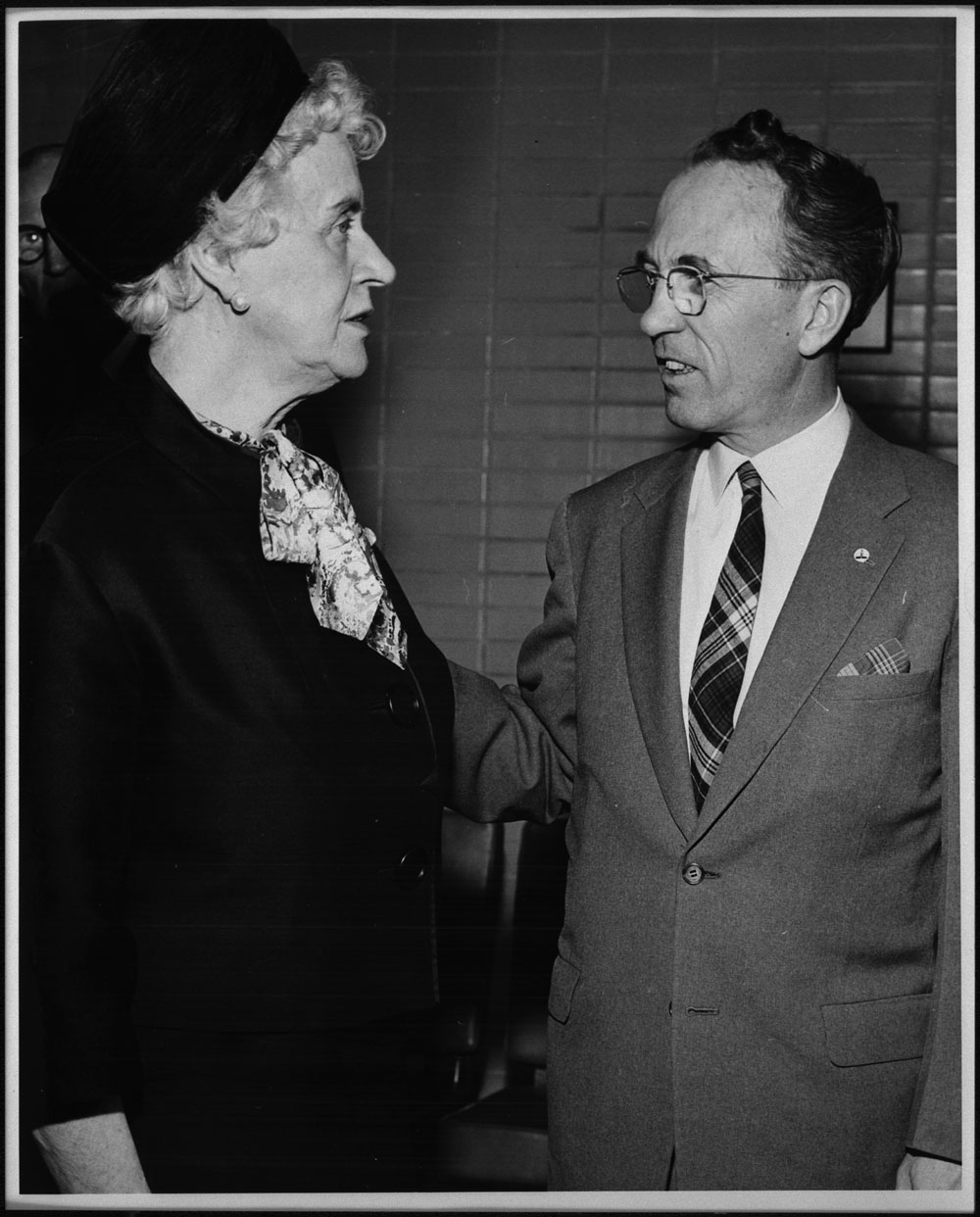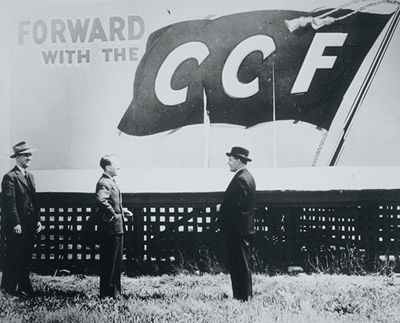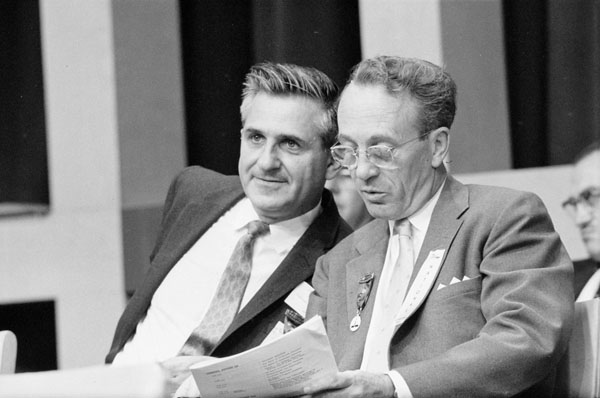
Early Life and Education
Thomas Clement Douglas was born in Falkirk, Scotland, one of three children of Annie (née Clement) and Thomas Douglas. His father was an iron moulder, a strong supporter of the Labour Party and an admirer of Scottish poet and nationalist Robert Burns. His mother, who was the daughter of a Baptist preacher, was “the religious influence in our home.”
In 1911, the Douglas family immigrated to Canada and settled in Winnipeg, Manitoba. Thomas Douglas was frustrated by the slow pace of social and government reform in Britain and looked to Canada for a new start. Although he found work in Winnipeg, the next few years were difficult for his young son.
Before they left Scotland, six-year-old Tommy Douglas had fallen and injured his knee, cutting it on a stone. The wound didn’t heal, and he developed osteomyelitis, a rare but serious infection of the bone. His osteomyelitis continued to flare up once the family had settled in Winnipeg, and Tommy spent a great deal of time in the hospital. He had several operations, none of which really helped. Doctors finally told the family that his right leg would have to be amputated. Fortunately, a well-known orthopaedic surgeon, Dr. R.J. Smith, became interested in his case and offered to operate on Douglas for free if his parents allowed medical students to observe his treatment. The operation was a success and inspired Douglas’s later belief that quality medical care should be available to all Canadians, regardless of wealth or status.
During the First World War, his father volunteered for overseas service in the Royal Canadian Army Medical Corps. He was a veteran of the Boer War, where he had served with the Argyll and Sutherland Highlanders. This time, though, he was inspired by pacifist social reformers like J.S. Woodsworth and decided that he would only serve if he didn’t have to carry a weapon. In April 1916, Thomas Douglas enlisted in the No. 12 Canadian Field Ambulance and was sent overseas, where he served in France. The rest of the family returned to Scotland and lived with Annie’s parents in an apartment in Glasgow. Young Tommy Douglas attended high school in Glasgow and paid his own school fees by doing odd jobs. However, he dropped out in 1918, during his second year, and began to work in the office of a cork factory.
In 1919, the Douglas family returned to Winnipeg, where Tommy got a job as a messenger. Soon after their return, he witnessed the Winnipeg General Strike of 1919, during which nearly 30,000 workers went on strike. On 21 June 1919, Douglas watched as members of the North-West Mounted Police fired their revolvers into a crowd of protesters, killing one and wounding several others. This left a lasting impression on him. The government’s response was “all part of a pattern,” according to Douglas. “Whenever the powers that be can’t get what they want, they’re always prepared to resort to violence or any kind of hooliganism to break the back of organized opposition.”
Did You Know?
Tommy Douglas began boxing at age 15 at a gym run by the One Big Union, a syndicalist trade union based in western Canada. He won the Lightweight Championship of Manitoba in 1922 and 1923.
Douglas began a printer’s apprenticeship at age 14 and qualified as a journeyman printer five years later. During this period, he also joined his mother’s church, Beulah Baptist Church, where he was eventually preaching sermons. Douglas was convinced that he could make a difference as a pastor and began to save money for theological studies. In 1924, he started attending Brandon College, where he spent the next six years finishing the full high school curriculum and qualifying for the ministry. Douglas did well at Brandon College, winning gold medals and other academic prizes and eventually becoming “senior stick,” which was president of the school council. During his studies, he also embraced the Social Gospel movement, which is based on the belief that Christianity is, above all, a social religion, concerned as much with improving this world as with the life hereafter. Shortly after he graduated from Brandon College, he married Irma Dempsey.
Ministry and Politics
After his ordination as a minister in 1930, Tommy and Irma Douglas moved to Weyburn, Saskatchewan. He was dismayed by the suffering he saw there, as the province was especially hard hit by economic depression and drought. Many farmers became destitute and were unable to feed and house their families. Ninety percent of the rural residents in the Weyburn area received some form of government relief, but this was very limited and of little help. There was no money for school and a complete lack of medical care. As Douglas later recalled, “I remember burying a girl 14 years of age who had died with a ruptured appendix and peritonitis. There isn’t any doubt in my mind that it was just an inability to get her to a hospital. I buried…[two] young men in their 30s with young small families, who died because there was no doctor readily available and they hadn’t the money to get proper care.”
Douglas did his best to help. He set up classes in his church, organized food and clothing drives and worked with local union leaders to pressure the government over jobs and unemployment assistance (see Social Security). He also began talking with other ministers, teachers and labour leaders about how to improve Canadian politics and society.
At the same time, Douglas continued with his studies. In the summer of 1931, he began a PhD in sociology at the University of Chicago. He became disappointed with the approach of American socialists, who seemed more interested in ideas than in direct action. Instead of finishing his PhD in Chicago, Douglas decided to complete a master’s degree in sociology through McMaster University, which was affiliated with Brandon College.
Did You Know?
In the 1930s, Douglas became convinced that eugenics policies could help improve society and lessen suffering. In 1933, he received a Master of Arts in sociology from McMaster University for his thesis, titled “The Problems of the Subnormal Family.” In the thesis, Douglas recommended several eugenic policies, including the sterilization of “mental defectives and those incurably diseased.” His ideas were not unique, as two Canadian provinces (and 32 American states) passed sexual-sterilization legislation in the 1920s and 1930s. By the time Douglas became premier of Saskatchewan in 1944, though, he had abandoned his support for eugenic policies (see Tommy Douglas and Eugenics).
His studies, along with his experience during the Great Depression, convinced Douglas that political action was necessary. Only government intervention could alleviate the suffering he saw around him, but the traditional political parties were reluctant to make any significant changes to the existing system. In 1932, he established a local association of the Independent Labour Party. Two years later, he attended the national convention of what would become the Co-operative Commonwealth Federation (CCF). According to Douglas and other members of the CCF, capitalism had failed Canadians. Instead, they believed that socialism was the solution to poverty and inequity.

CCF Member of Parliament
Tommy Douglas ran unsuccessfully in the 1934 Saskatchewan election. Undeterred by this failure, he decided to run as a CCF candidate in the 1935 federal election. This time, he was successful, partly because he had learned to exploit a special talent: the ability to make people laugh. His speeches often began with jokes, from long stories to punchy one-liners. Most famous, perhaps, was his story of Mouseland.
Mouseland was a place where all the little mice lived and played, were born and died. And they lived much the same as you and I do. They even had a Parliament. And every four years they had an election…. And every time on election day all the little mice used to go to the ballot box and they used to elect a government. A government made up of big, fat, black cats. Now if you think it strange that mice should elect a government made up of cats, you just look at the history of Canada for the last 90 years and maybe you’ll see that they weren’t any stupider than we are. Now I’m not saying anything against the cats. They were nice fellows. They conducted their government with dignity. They passed good laws — that is, laws that were good for cats. But the laws that were good for cats weren’t very good for mice…. Presently there came along one little mouse who had an idea. My friends, watch out for the little fellow with an idea. And he said to the other mice, “Look fellows, why do we keep on electing a government made up of cats? Why don’t we elect a government made up of mice?” “Oh,” they said, “he’s a Bolshevik. Lock him up!” So they put him in jail. But I want to remind you: that you can lock up a mouse or a man but you can’t lock up an idea.
The Second World War further convinced Douglas that the socialist case was valid. Although he had heard members of Parliament argue repeatedly that there was not enough money to create jobs for the unemployed, they had no difficulty finding enough funds to finance a war. During his first two terms in Parliament, Douglas earned a reputation for being a skilful and witty debater. He claimed to represent the underprivileged and exploited, and he took unpopular stands in defence of civil liberties.
Despite his criticism of Parliament, Douglas supported Canadian involvement in the Second World War. Although CCF party leader J.S. Woodsworth was a staunch pacifist, Douglas was not. “If you accept the completely absolutist position of the pacifist, then you are saying that you are prepared to allow someone else who has no such scruples to destroy all the values you’ve built up,” he said. On a visit to Germany in 1936, he was appalled by German militarism and convinced that Hitler had to be stopped. In September 1939, the CCF voted to formally support Canada’s war effort, with some limitations. After France fell in 1940, the party wholeheartedly supported the war, including conscription if necessary. Douglas enlisted in the Canadian army and volunteered for an expedition to Hong Kong, but he was rejected for overseas service due to his old leg injury.

The Honourable T.C. Douglas, Premier of Saskatchewan, talking with Private P. Campbell of The Saskatoon Light Infantry (M.G.), Barneveld, the Netherlands, 29 April 1945.
(photo by Lieut. G. Barry Gilroy, courtesy Canadian Department of National Defence/Library and Archives Canada / PA-138035)
Premier of Saskatchewan
In 1944, Tommy Douglas resigned his federal seat to contest the Saskatchewan general election. He led the CCF to a decisive victory, winning 47 of 53 seats in the provincial legislature. As premier of the province for the next 17 years, he became a symbol of what the socialist alternative promised. His government was innovative and efficient and pioneered many programs that would later be implemented by others. This included the creation of several crown corporations, including the Saskatchewan Power Corporation, and the establishment of Saskatchewan Government Insurance, Canada’s first publicly owned automobile insurance service. His government also passed the Saskatchewan Bill of Rights in 1947 (long before the Canadian Bill of Rights of 1960), as well as legislation that allowed the unionization of public servants.
Health Insurance
The most significant innovation during Tommy Douglas’s time as premier of Saskatchewan was the implementation of government-funded health insurance. In 1947, the Saskatchewan Hospital Services Plan came into effect. It was the first hospital insurance plan in Canada. By 1954, around 810,000 people in Saskatchewan were covered by the plan. Saskatchewan’s example prompted the federal government to create a national plan that helped fund diagnostic services and hospital-operating costs in conjunction with the provinces.
However, it was Saskatchewan that first implemented a system of full health insurance. This approach was first pioneered in the Swift Current health region, following encouragement by the provincial government. In this region, citizens and healthcare providers worked together to develop a comprehensive medical services plan. However, when the province tried to extend the program to other regions, it faced opposition from the College of Physicians and Surgeons of Saskatchewan, which argued that existing prepaid plans worked well enough.
Douglas’s government was determined to provide a system of full health insurance to the people of Saskatchewan. In October 1961, the government introduced the Saskatchewan Medical Care Insurance Act. It was passed and given royal assent in November 1961. Douglas had played a lead role in developing and promoting the plan, but he resigned as premier only a few days before the bill became law. His successor, Woodrow Lloyd, faced stiff opposition from doctors, who went on strike to protest the legislation. However, the two sides finally reached an agreement on 23 July 1962. Saskatchewan had the first comprehensive health insurance plan in the country. In 1966, the federal government followed suit with the Medical Care Act (see Health Policy).

David Lewis and Tommy Douglas at the founding convention of the New Democratic Party (1961).
(courtesy Horst Ehricht / Library and Archives Canada / PA-180405)
Leader of the New Democratic Party
Tommy Douglas resigned as premier of Saskatchewan in 1961 to become leader of the federal New Democratic Party (NDP). The NDP was created as a formal alliance between the CCF and organized labour. Douglas was the new party’s obvious choice, primarily because of his success in Saskatchewan but also because he was universally regarded as the left’s most eloquent spokesman. He was able to inspire and motivate party workers and could explain democratic socialism in moral, ethical and religious terms.
Despite these qualifications, Douglas was defeated in the federal election of 1962. His defeat was largely because of the backlash against the Saskatchewan government’s introduction of Medicare, which had resulted in a long and bitter strike by the province’s doctors (see Saskatchewan Doctors’ Strike).
However, Douglas won a seat in a by-election later that year in the British Columbia riding of Burnaby– Coquitlam. He served as leader of the NDP until his resignation in 1971, when David Lewis became the new party leader. Douglas served as his party’s energy critic until his retirement in 1979. He was made Companion of the Order of Canada in 1981.
Personal Life
Tommy Douglas married Irma Dempsey in 1930. The couple had two daughters: actress Shirley Douglas and nurse Joan Douglas. Their grandchildren include actor Kiefer Sutherland, the son of Shirley Douglas and her second husband, actor Donald Sutherland.
Significance
Though Tommy Douglas did not realize his dream of a socialist Canada, he and his colleagues had considerable influence on the government. Programs such as Medicare, a Canada-wide pension plan, and bargaining rights for civil servants were first advocated by Douglas and his party and are now widely accepted in Canada.

 Share on Facebook
Share on Facebook Share on X
Share on X Share by Email
Share by Email Share on Google Classroom
Share on Google Classroom


